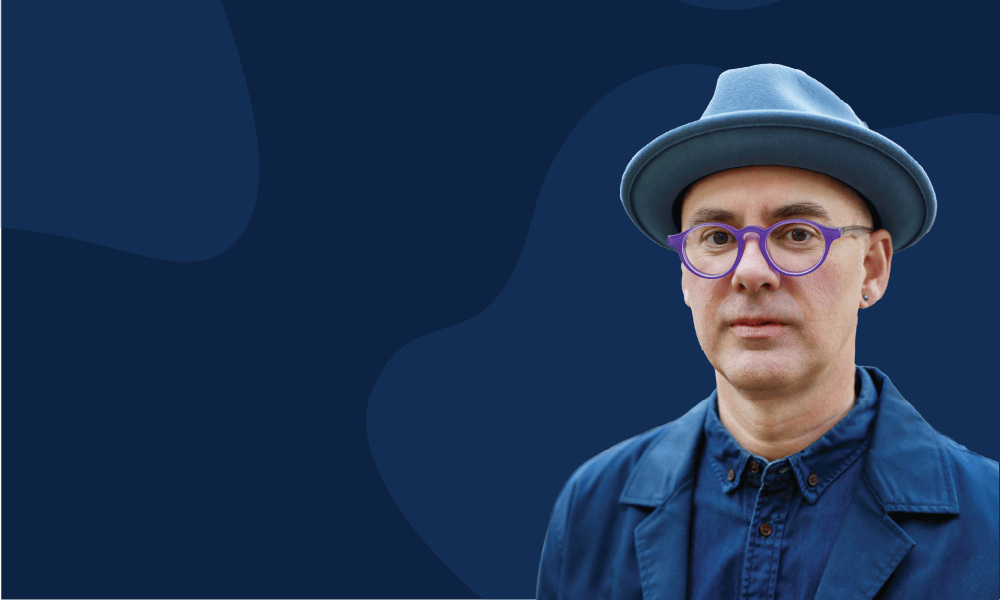
Michael V. Smith, Researcher of the Year recipient in Social Sciences and Humanities, is reshaping narratives through queer storytelling— from verse to video, memoir to media—challenging how we see the world.
Michael V. Smith creates art from a queer, gendered and class-conscious lens
The power of story has the ability to re-shape what we think we know, to bring us together and to make us better people. For Michael V. Smith, there is nothing with greater potential for power than a story.
Smith was named UBC Okanagan’s 2025 Social Sciences and Humanities Researcher of the Year. He is an interdisciplinary artist, working as a writer, filmmaker and performance artist. He is a Professor of Creative Writing, teaching courses in narrative, spoken word, digital media and screenwriting and in editing and publishing.
As a creative practitioner, his research practice spans a variety of creative genres, including authoring seven books, editing two poetry collections, creating experimental short film and feature documentary filmmaking, collaborative photography projects, live YouTube performance events and performing stand-up improv comedy and spoken word.
His entire research practice is deeply involved in EDI work, resulting from his queer and genderqueer identities, as well as his commitment to discussions of social and economic class and power.
Seeking an authentic representation
As a genderqueer kid growing up, Smith rarely saw himself reflected in the world around him. Institutions, media and social dynamics all reinforced that he was an outsider.
“I never saw people like me—queer, gender diverse or poor—represented authentically. What I saw were stereotypes, reductive portrayals and a narrow version of humanity. My work, whether through film, poetry, fiction or performance is about pushing back against these dominant narratives.”
He creates work from a queer, gendered and class-conscious lens to challenge cultural norms, embody difference and make space for voices often erased.
“I want to make the familiar strange and the strange familiar—to help people understand that freedom means true self-determination, not arbitrary rules about gender, class or appearance.”
He says his goal is to disrupt conformity and expose the limits of cultural expectations, while recognizing the shared humanity in honest expression and lived experience.
Recently, Smith along with Dr. Astrida Neimanis and grad student Erin Scott received a major grant for the project, Biodiversities of Gender, which explores how gender diversity can act as a pressure point in addressing the climate crisis. By drawing parallels between biodiversity and gender, the project looks both ways—how each informs and strengthens the other. Monocultures damage ecosystems, just as rigid gender binaries harm social health. Thriving bodies, ecosystems and cultures all rely on complexity, variety and fluidity.
This work challenges the assumption of two fixed genders, pushing back against groupthink and monoculture, and instead argues for a resilient and diverse understanding of identity and environment.
Undoing false narratives
Over the past couple of years, he has had two major projects come out—a feature documentary and a poetry collection.
In his film, The Floating Man, Smith examines the false narratives he’s faced about his body over his lifetime; his students are also featured in the film and share how Smith’s work and teachings in class have helped them through their own gender journeys.
“For the film, I interviewed two students who had transitioned—people I knew—because the film explores the complexity of gender, how it’s a fiction we subscribe to that shifts over time and across cultures.”
Their voices helped map out how gender is inscribed in us, and how we unlearn it to remake ourselves on our own terms. Smith’s work as an artist helps expose those stereotypes and undo those narratives to show a more truthful face of what and who we actually are and how we actually live.
In his latest collection of poetry Queers Like Me, Smith explores growing up queer and working class, then growing into an urban queer life.
Smith received a lot of community feedback for this poetry collection, including from students. “I hosted public readings in Kelowna, and workshopped poems through Inspired Word Café. That’s what I love about being at a university in a smaller city—university and community overlap so much.”
Smith is also very involved with the community as a volunteer for the Inspired Word Café, and creator and host of Pony Cabaret, a celebration of queer culture with performances featuring drag, storytelling, comedy and burlesque.
“There is not a single venue like Pony in all of the Okanagan, where queer performers from a variety of backgrounds can do experimental work.”
Smith says that for him, empathy is everything.
“It’s not enough to just tell a story—you can hear a story and not care. What I’m trying to do in art is create feeling, to make people care, to nurture empathy. I want audiences to feel what it’s like to live someone else’s experience and recognize their own humanity in it.”
Art becomes the vehicle for that translation of humanity—resisting monoculture and deepening our sense of nuance and connection.